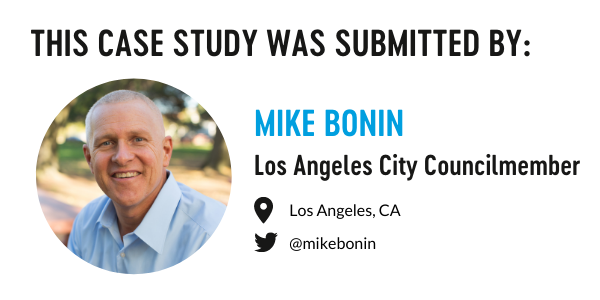Removing Armed Officers from Traffic Enforcement
Los Angeles, CA
Population: 2,000,000 - 5,000,000 | Government type: City | Topic: Reimagining Public safety
OVERVIEW
In June 2020, Los Angeles Councilmembers Marqueece Harris-Dawson, Mike Bonin, Curren Price, and Herb Wesson introduced a motion to evaluate the potential of transferring traffic enforcement responsibilities from armed police officers to alternative agencies, such as civilian personnel in the Department of Transportation, and automated enforcement technologies. This change is supported by the PUSH-LA coalition, a group of community and civil liberties organizations based in South Los Angeles working against Los Angeles Police Department’s (LAPD) use of pretextual traffic stops.
The city is working with community-based organizations to develop this alternative enforcement model before presenting it for public input. The motion is expected to receive a hearing in early 2021 with an undefined timeline for the evaluation and consideration of recommendations.
In June 2020, Councilmember Bonin’s motion was approved to create a Transit Public Safety Advisory Committee to make recommendations for reforming and rescoping the multi-agency police contract that Metro has with LAPD, LA County Sheriffs, and Long Beach Police Department. The contract is up for renewal in 2022 so the process is starting now to write a new scope of work and determine the overall size of the policing program. The new contract is expected to run through 2028 and include support during major city-wide events, like the Super Bowl and Olympics.
Collaborative Governance
The ideas for this motion came from a coalition of community advocates, who continue to engage directly with city leadership to shape the process and its outcome.
A formal public input process has not yet been conducted, so it is too soon to tell whether the community will successfully drive the outcomes of this process. Discussions to date have included the need for both broad and deep engagement, focused on the communities most affected by racial profiling. There's been discussion on town halls, focus groups, and direct dialogue with community leaders. A third-party consultant may be able to support engagement efforts if funding is available.
Metro received substantial interest, with 380 applications from interested individuals to serve on the Transit Public Safety Advisory Committee. Next, Metro will whittle it down to a manageable committee size that reflects the various perspectives in terms of demographics and issue expertise. Notably, the committee includes both rider and operator voices because labor cares deeply about security issues their members face. Transit agency leadership is in full support of this initiative, including CEO Phil Washington and System Security and Law Enforcement Chief Bob Green.
Emphasis on equity
Pretextual traffic stops are a common crime suppression strategy used particularly heavily in low-income Black and brown communities. Less than one percent of these stops result in citation or arrest, making them an ineffective crime-fighting tactic, and they sow distrust between law enforcement and the community. This distrust undermines legitimate traffic safety efforts, which are needed to reduce traffic violence that disproportionately affects low-income communities of color.
Scaling back the role of the police department and redeploying those resources to other public safety strategies is a foundational realignment of institutional power in city government. Over time, the police department's staff, funding, and power have only grown, while other city agencies that support community health and wellbeing are starved for resources. A deliberate downscoping of police responsibilities would disrupt this trend and provide an opportunity for community leadership to advocate for a different use of resources.
Analysis
The work is in the early stages, but as of now, there are no legal challenges.
Local government dynamics: the council is moderately progressive, representing a diverse constituency in the country’s second largest city. The mayor is not known for his progressive stance on policing.
Policy: This policy is in the initial and exploratory stage, however, if successful it has the potential to significantly reduce the presence of police and potential for state-sanctioned violence in Black, Indigenous, and communities of color.
Last updated: January 19, 2021
If you’re interested in learning more, please contact info@localprogress.org














